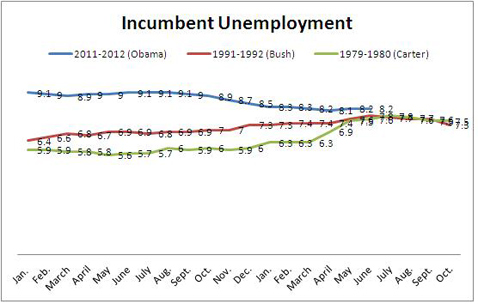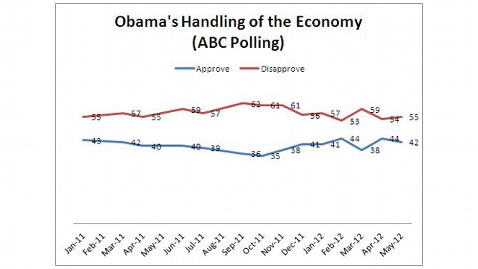Jobs Report: What Does It Mean for Obama, Romney?
What was true yesterday is true today: President Obama faces uncertain re-election prospects, largely because of unemployment.
In June, the national unemployment rate remained constant at 8.2 percent even as the economy added 80,000 jobs, the Bureau of Labor Statistics announced Friday morning.
Despite progress, the report is troubling. In fall and winter, jobs grew steadily, with unemployment dropping .1 percent in September and October, then .2 percent in November, December, and January. Since January, it's only dropped .1 percent total. The trend has flattened.
Get more pure politics at ABC News.com/Politics and a lighter take on the news at OTUSNews.com
Unemployment has dominated Obama's political situation since he took office, and, throughout 2009, the White House argued that bad jobs numbers were a lagging indicator of the financial industry's collapse in 2008. That logic has been borne out, more or less: unemployment topped out at 10 percent in October 2009 and has been getting better since, improving most notably since it crested again at 9.8 percent in November 2010.
But the clock is winding down. Obama backers have argued that it's the trajectory, not the rate, that will determine Obama's fate in November. Now, that trajectory doesn't look as encouraging as it once did.
Americans do hold Obama accountable for slow recovery.
On "handling the economy," Obama's approval has lagged in negative territory, but his numbers have risen on good jobs news. In February, the day after BLS announced that unemployment had dropped .2 percent for the third consecutive month, ABC polling showed his economic approval/disapproval ratings at -9 percent, their best in a while.
But when the jobless rate has stayed flat, confidence in Obama has dropped. After the rate stuck at 9.1 percent last summer, Obama registered 62 percent disapproval on Sept. 1. We're seeing that again, as a May 20 ABC poll showed his approval/disapproval on the economy at -13 percent.
Trendwise, Obama has it much better than Jimmy Carter and George H.W. Bush, the last two incumbent presidents whose re-election campaigns were dominated by the economy. But unless the rate drops several percentage points by October-the number that will be released on Nov. 2, four days before Election Day-Obama's Election-Day unemployment rate will far exceed those that coincided with the defeats of Carter and Bush, 7.5 percent and 7.3 percent respectively.

Obama's trend is better, but his Election-Day unemployment rate could be much higher than Carter's or Bush's.
If BLS announces an unemployment rate around 8 percent on Nov. 2, the news will strain Democrats' political hypothesis about the importance of direction.
As the White House noted, there were some positive signs in these numbers, with 11,000 new manufacturing jobs and a .1-hour increase in the average private-sector workweek. Polling, however, shows Obama's fate will likely be tied to the pace of recovery, rather than the fact that recovery is happening.
Obama may not need a game-changer.
Americans seem unhappy with Obama, but they're not yet sold on Romney. On the question of whom voters trust more to handle the economy, the latest ABC polling shows Obama and Romney in a statistical tie. (Romney led by one percentage point.) Respondents trusted Obama more on "creating jobs." When it comes to unemployment, the political question is still: Whom do voters believe in?
Along with the jobless rate, the fundamental dynamics of the presidential race remained unchanged.
Obama, facing this slow recovery, has admitted that things aren't improving quickly enough, and he's turned to a message of economic fairness-which concerns voters far more than over-regulation, although the centrist Democratic group Third Way has found that message won't move independents. On his current bus tour in Ohio and Pennsylvania, Obama has driven the central message of his campaign, which he's also deployed in TV ads: that Romney and Republicans aren't looking out for middle-class voters, and that they favor the rich.
"Mr. Romney and his allies in Congress, they've got a particular view," Obama told a crowd in Parma, Ohio, yesterday, the Cleveland Plain Dealer reported. "They believe if we cut taxes, especially for the wealthiest Americans … that somehow all this is going to benefit you."
Romney's central message, meanwhile, is that Obama is bad for the economy, and that if Romney is put in charge, things will improve. When distracted by issues ranging from immigration to women's reproductive health, Romney has pivoted back to the dismal unemployment rate.
If BLS brings stellar economic news before Election Day, Romney's main point may be hurt, and Obama may be saved by a deus ex machina of sorts. That didn't happen Friday, and the race continues, with a bit more urgency for the president.
